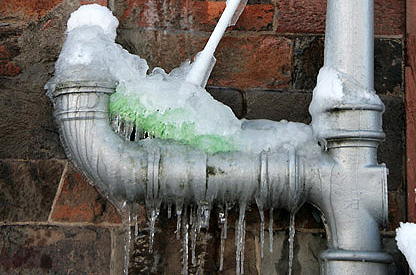Essential Tips to Avoid Frozen Pipes in Cold Weather: Professional Guidance
Essential Tips to Avoid Frozen Pipes in Cold Weather: Professional Guidance
Blog Article
The content which follows involving Prevent Frozen Pipes is exceedingly motivating. Read it for your own benefit and figure out what you think about it.

Cold weather can ruin your plumbing, particularly by freezing pipes. Right here's just how to prevent it from taking place and what to do if it does.
Introduction
As temperature levels drop, the risk of icy pipelines rises, potentially bring about costly repair services and water damages. Understanding how to avoid icy pipes is vital for home owners in chilly climates.
Recognizing Frozen Pipelines
What causes pipes to freeze?
Pipelines ice up when subjected to temperatures listed below 32 ° F (0 ° C) for expanded periods. As water inside the pipes ices up, it expands, putting pressure on the pipe wall surfaces and potentially causing them to rupture.
Risks and problems
Frozen pipes can lead to water supply disruptions, residential or commercial property damages, and expensive repair services. Ruptured pipes can flooding homes and create extensive architectural damages.
Indicators of Frozen Water Lines
Identifying icy pipes early can avoid them from bursting.
Just how to determine frozen pipes
Seek decreased water flow from faucets, unusual smells or noises from pipelines, and visible frost on subjected pipelines.
Avoidance Tips
Protecting vulnerable pipelines
Wrap pipelines in insulation sleeves or utilize warmth tape to shield them from freezing temperatures. Focus on pipes in unheated or outside locations of the home.
Heating strategies
Maintain interior spaces adequately heated up, particularly areas with pipes. Open cupboard doors to enable cozy air to distribute around pipes under sinks.
Protecting Outside Plumbing
Garden tubes and outside taps
Disconnect and drain pipes garden pipes prior to winter months. Install frost-proof spigots or cover exterior faucets with protected caps.
What to Do If Your Pipelines Freeze
Immediate activities to take
If you think icy pipelines, keep faucets available to ease stress as the ice thaws. Use a hairdryer or towels soaked in hot water to thaw pipelines gradually.
Long-Term Solutions
Structural changes
Think about rerouting pipelines away from outside wall surfaces or unheated areas. Add additional insulation to attic rooms, cellars, and crawl spaces.
Upgrading insulation
Invest in premium insulation for pipes, attics, and wall surfaces. Appropriate insulation assists maintain regular temperature levels and decreases the threat of frozen pipes.
Verdict
Protecting against icy pipelines requires proactive procedures and fast responses. By comprehending the reasons, signs, and preventive measures, property owners can secure their plumbing throughout cold weather.
Helpful Tips to Prevent Frozen Pipes this Winter
UNDERSTANDING THE BASICS: WHY PIPES FREEZE AND WHY IT’S A PROBLEM
Water freezing inside pipes is common during the winter months, but understanding why pipes freeze, and the potential problems it can cause is crucial in preventing such incidents. This section will delve into the basics of why pipes freeze and the associated problems that may arise.
THE SCIENCE BEHIND FROZEN PIPES
When water reaches freezing temperatures, it undergoes a physical transformation and solidifies into ice. This expansion of water as it freezes is the primary reason pipes can burst. As the water inside the pipe freezes, it expands, creating immense pressure on the walls. If the pressure becomes too great, the pipe can crack or rupture, leading to leaks and water damage.
FACTORS THAT CONTRIBUTE TO PIPE FREEZING
Low Temperatures: Extremely cold weather, especially below freezing, increases the risk of pipes freezing. Uninsulated or Poorly Insulated Pipes: Pipes located in unheated areas, such as basements, crawl spaces, or attics, are more prone to freezing. Insufficient insulation or lack of insulation altogether exacerbates the problem. Exterior Wall Exposure: Pipes running along exterior walls are susceptible to freezing as they encounter colder temperatures outside. Lack of Heating or Temperature Regulation: Inadequate heating or inconsistent temperature control in your home can contribute to frozen pipes. PROBLEMS CAUSED BY FROZEN PIPES
- Pipe Bursting: As mentioned earlier, the expansion of water as it freezes can cause pipes to burst, resulting in significant water damage.
- Water Damage: When pipes burst, it can lead to flooding and water damage to your property, including walls, ceilings, flooring, and personal belongings.
- Structural Damage: Prolonged exposure to water from burst pipes can compromise the structural integrity of your home, leading to costly repairs.
- Mold and Mildew Growth: Excess moisture from water damage can create a favorable environment for mold and mildew growth, posing health risks to occupants.
- Disrupted Water Supply: Frozen pipes can also result in a complete or partial loss of water supply until the issue is resolved.
WHY CERTAIN PIPES ARE MORE PRONE TO FREEZING
- Location: Pipes located in unheated or poorly insulated areas, such as basements, crawl spaces, attics, or exterior walls, are at higher risk of freezing.
- Exterior Pipes: Outdoor pipes, such as those used for irrigation or exposed plumbing, are particularly vulnerable to freezing as they are directly exposed to the elements.
- Supply Lines: Pipes that carry water from the main water supply into your home, including the main water line, are critical to protect as freezing in these lines can affect your entire plumbing system.
- Underground Pipes: Pipes buried underground, such as those connected to sprinkler systems or outdoor faucets, can be susceptible to freezing if not properly insulated.
https://busybusy.com/blog/helpful-tips-to-prevent-frozen-pipes-this-winter/

We hope you liked our part about Preventing and dealing with frozen pipes. Thanks for finding the time to read through our blog post. Enjoyed our write up? Please share it. Help somebody else locate it. Thank you for your time spent reading it.
Click Here Report this page